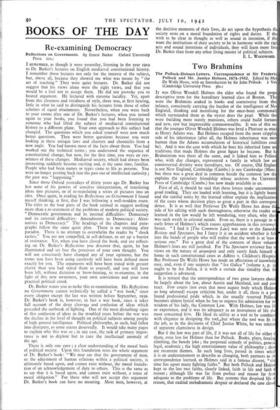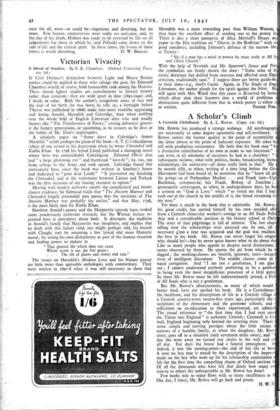Two Brahmins
IT was Oliver Wendell Holmes the elder who found the pr descriptive term for the hereditary learned class of Boston. Th were the Brahmins soaked in books and controversy from the infancy, consciously carrying the burden of the intelligence of Ne England, thinking and moralising for the once-born commonal which surrounded them as the oyster does the pearl While th were building more stately mansions, others could build fortun and new, raw but improveable commonwealths. It was of this s that the younger Oliver Wendell tiolmes was bred a Pharisee as mu as Henry Adams was. But Holmes escaped from the more crippl side of his inheritance (after all, the Holmes inheritance was mo human than the Adams accumulation of historical liabilities co be). And it was the ease with which he bore his inherited fame a traditions that made Holmes the great figure he became. But Brahminism was there all the same, and it linked him to Polloc who, with due changes, represented a family in which law a controversial divinity were hereditary, too. Of course, Old Engl is not New England, Cambridge (Cambs.) is not Cambridge (Mass. but there was a great deal in common beside the common law th explains the epistolary friendship whose archives the Universi Press of Cambridge (Cambs.) has now made available to us.
First of all, it should be said that these letters make uncommonl good reading. They are loaded with learning, but it is lightly born and the careful notes by the learned editor explain the implicatio of the cases whose decision plays so great a part in this correspo dence. It is as well that Professor De Wolfe Howe has done side of his editing with such thoroughness, otherwise the reader learned in the law would be left wondering, very often, why ther was such wrath in celestial minds. Even so, there is a passage in early letter of Holmes's which rouses apprehension in this reviewer breast. " I find it [The Common Law] was sent to the Saturd Review and Spectator, but I fancy it is an accident whether it fal into the hands of people who will realise that the work is at least serious one." For a great deal of the contents of these volum Holmes's fears are still justified. For The Spectator reviewer has views on the nature of assumpsit and only rarely finds himself home in such constitutional cases as Adkins v. Children's Hospit But Professor De Wolfe Howe has made an affectation of knowledg easy, and, even if one suspects that " lex Galica " (volume 1, p. 34 ought to be lex Salica, it is with a certain due timidity that th suggestion is advanced.
It is natural that the correspondence of two great lawyers shou be largely about the law, about Austin and Maitland, tort and co tract. Few courts (not even that most august body which Holm so long adorned) escape criticism but, under it all, there is a pr found professional pride which, in the usually" reserved Polloc becomes almost lyrical when he has to express his admiration for th wisdom of his lady, the Common Law. With Holmes, law was li or experience, and it was its adequacy as an instrument of life th most concerned him. He liked its utility as a tool to be combine with elegance in designing the tool,.but where the tool was fit f the job, as in the decisions of Chief Justice White, he was tolerar of apparent clumsiness in design.
But if the law was part of life, if it was not all of life for either them, even less for Holmes than for Pollock. Books, plays, fencin climbing, the bawdy joke ; the perpetual comedy of politics, gene legal, academic ; the high entertainment value of philosophy ; the are recurrent themes. In such long lives, passed in times whi it is an understatement to describe as changing, both partners to correspondence learned, as Holmes said in a famous dissent, " th time has upset many fighting faiths." But both Pollock and Holm kept to the last two faiths, closely linked, faith in life and faith reason ; although life was far from perfect and reason far fro adequate to the problems of life. But systems that despised life reason, that exalted melodramatic despair or declared the case dos
once for all, were—or could be—ingenious and diverting, but no more. Few human controversies were really res judicatae, and, to the day of his death, Holmes was ready to be reversed by life on all judgements but those in which he (and Pollock) came down on the side of life and the critical spirit. In these times, the lesson of these



























 Previous page
Previous page